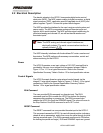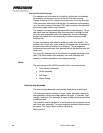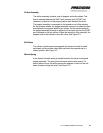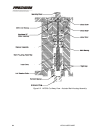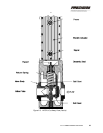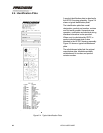
Alarms
The HFG2.0 provides two two-wire alarm signals via the integral 17-wire
signal harness. The discrete alarm outputs are solid-state switches which
are normally closed. The user’s controller provides +24 VDC to complete
the circuit. Refer to Figure 1-16 for typical connections. Refer to the
General Specification Summary Table in Section 1.2 for alarm
specification values. See Section 3.7 for additional details about alarms.
FAULT Alarm
The fault configuration for the FAULT alarm is programmable in the most
recent generation
of the HFG2.0 (factory-configurable only). If a fault
condition occurs, the FAULT alarm switch will open, interrupting the circuit
with the user’s controller. See Table 3-1 for the default configuration
.
See Table 3-3 for a list of fault conditions represented by the FAULT
alarm in earlier generations
of the HFG2.0.
OVERTEMP Alarm
The fault configuration for the OVERTEMP alarm is programmable in the
most recent generation
of the HFG2.0 (factory-configurable only). If a
fault condition occurs, the OVERTEMP alarm switch will open,
interrupting the circuit with the user’s controller. The default configuration
for the OVERTEMP alarm is Motor OVERTEMP, where the circuit will
open if the temperature in two or more of the motor winding exceeds
135°C. See Table 3-2 for details about the default configuration
.
In earlier generations of the HFG2.0, the OVERTEMP alarm is dedicated
to Motor Over Temp
and Electronics Over Temp faults. If
the HFG2.0 detects that the temperature in two or more of the motor
windings exceeds 130° C
or the electronics temperature
exceeds 110° C
the OVERTEMP circuit will open (see Table 3-4).
In generation
, the Electronics Over Temp fault is assigned to the
FAULT alarm. If the electronics temperature exceeds 110° C
the
FAULT circuit will open (see Table 3-3).
RS232 Communications
The HFG2.0 allows for RS232 serial communication through three wires
in the integral 17-wire signal harness. The RS232 wires, Rx IN, Serial Tx
OUT and Serial RTN, are used to communicate with a user-provided
computer. Serial communication can be used to change the HFG2.0 set-
up parameters and to retrieve fault diagnostics. Contact Precision Engine
Controls Corporation to request fault diagnostic software. See Section 3.8
for additional details about set-up parameters.
CH. 2: UNDERSTANDING THE HFG2.0 29








